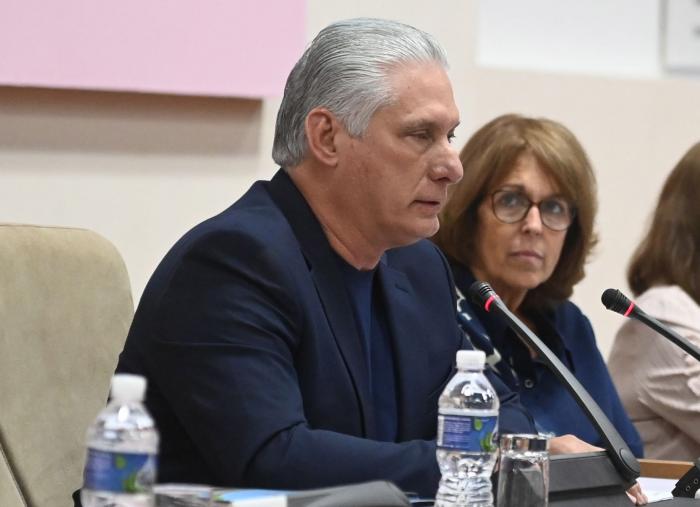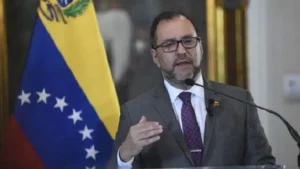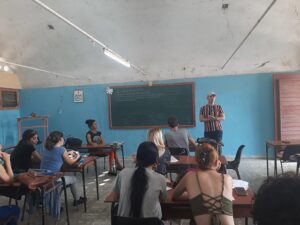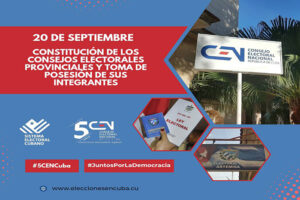Intervention by Miguel Mario Díaz-Canel Bermúdez, First Secretary of the Central Committee of the Communist Party of Cuba and President of the Republic, at the 10th Congress of Uneac, at the Convention Palace, on 2 November 2024, «66th Year of the Revolution».
We address you as the dear writers, artists and creators of the Homeland.
Once again, this is a congress that stimulates our thoughts and stirs our emotions, passions and commitments.
First of all, I would like to acknowledge Marta’s effort to be here today when she has been in a crisis, I don’t know whether to say of health or personal health, but she is here guiding this historic event (applause), and that shows a great sense of responsibility and also of commitment to what we are debating and to what we are trying to build from it.
I would also like to dedicate a sentiment of remembrance to those who are not with us today and who have been very active in these five years in the spaces where we have had the opportunity to debate with members of Uneac, in particular Corina and Pedro de la Hoz (applause).
And to my brother Guille Vilar I would like to say that recognising the enormous link between the Cuban and the universal is not colonising at all, on the contrary, it is how we decolonise ourselves. I agree with you (Applause).
I think that the follow-up given to the proposals and agreements of the previous Congress is significant, because one of the figures given in the documents circulated said that of 68 agreements, 49 had been fulfilled, 18 were in progress and one was pending.
The work carried out in the reports presented by the associations and the organisation’s permanent working committees is also highly recognised, bearing in mind that an important part of these five years was marked by the covid-19, which paralysed us in a number of areas of the country’s life, and that we had to focus, above all, on saving the lives of our compatriots, but culture did not stop and was also present, bringing spirituality, encouragement, cultivating emotions in our people. I believe that you made very much yours something that I asked of you at the last Congress: you did not let the Congress die and you contributed for the good of the nation in these five years that have passed.
I would therefore also like to acknowledge the contribution that this Congress is making in terms of discussion, ideas and proposals, and you will, of course, have our full support and commitment to follow up on what has been agreed and approved here in the coming years, just as we have done in the five years that have passed between Congress and Congress.
In retrospect, during this period the country has suffered transcendental socio-economic impacts, in addition to the more than sixty years of economic warfare waged by the empire against Cuba.
In the course of these five years, the persecution by the United States against Cuba has become extraordinarily acute, and culture has not been immune to these impacts, both in material terms and in the very spirituality of the nation.
We are facing a two-dimensional war: on the one hand, the economic war, designed to raise shortages to extreme levels and break the will of the entire people, and, in parallel, a cultural war that has a symbolic component, as Faya explained, a psychological component and a component of media intoxication, which have been put together in large-scale operations by the operators of the counterrevolution and which are aimed directly at the unity of our people.
In the face of these threats, culture continues to play a decisive role as a generator of ideas and values, or the sword and shield of the nation.
In the midst of another very difficult circumstance, Fidel said that culture is the first thing to be saved. This idea goes far beyond art, it goes to the roots, to identity, to Cuban identity, in short, to what we are. That is why I welcome the motto of this Congress: «Culture is the Homeland», an idea of another great, Don Fernando Ortiz, who says the same thing in other words: «To save culture is to save the Homeland».
And what can culture do to save itself? What is saving the homeland? This is a question we are all answering together. You have the answer, you have given it, and I am sure you will always continue to give it.
There is no way to impose creation: authentic art and culture are the expression of one’s own feelings and ideas; anything else is a copy. What is true, what endures, has originality as its distinctive value: Cuba’s powerful culture is the best proof of this.
Our identity was forged in the struggle first for independence and then against dependence, and those struggles were led by intellectuals and creators, whose traces are indelibly imprinted in great works of national culture such as the one that began this session when we all sang the Bayamo Hymn.
Fidel always emphasised the role of culture in shaping the spirituality of the people, in order not to let themselves be crushed and to overcome difficulties with their own efforts. In such difficult circumstances as the ones we are living in, this role takes on crucial dimensions.
Our spirituality, in all its dimensions, needs to grow in the reinforcement of the values that should distinguish a society in which we all recognise ourselves. That is why the issue of the role of culture in the current context has been very present in the debates. We have no doubt about the extraordinary contributions that culture can make not only to the Cuban nation, but also to the world.
Culture allows us to recognise ourselves as Cubans, the essence and part of the national project that began in 1868 and transformed a colony into a country with character, identity, its own profile and a national being that spontaneously springs forth in any latitude in which it lives.
Culture stimulates and reinforces the feeling of homeland.
Culture is the fundamental and indispensable nourishment for the spirituality of the people.
Culture provides us with freedom. Martí and Fidel said it many times, in different ways, but with the same meaning: without culture there can be no freedom.
In these days of confronting the destruction caused by the passage of a hurricane – and the hurricane is also an inseparable part of national life and of our condition as an island – we have witnessed the impact of cultural action in communities broken by a blow of nature.
Kcho, with the Martha Machado Brigade, now paying homage to General Espinosa, and the ever-young protagonists of the Guantánamo-Baracoa Theatrical Crusade know what I am talking about and how much culture can contribute to the essential spiritual restoration of these affected communities.
Culture is the fundamental substance of unity, which is in turn the strategic element for the survival of a small nation besieged by an empire, always hungry for power, which has never given up on possessing us by force or seduction. And if it has not already swallowed us up, one of the greatest merits is that of Cuban culture, so powerful, so strong from root to crown, like the ceiba of the Cuban mountain, and so authentic, that it cannot be supplanted or possessed no matter how much they try to do so.
That is why we are also talking about cultural colonisation. To unite in the struggle for the emancipation of women, against all forms of discrimination, and against one of the most humiliating, racial discrimination, is also to fight to decolonise ourselves. It should be noted that there are places in the country that are still identified with terms, names or traces of that racial discrimination, especially in colonial times. I believe that we must place visible, emancipatory marks in places that meant humiliation for men who were enslaved.
The interconnection between cultural colonisation and new technologies is ever greater nowadays, because of the way in which they combine and manage to hijack the subjectivity of individuals to the point of trivialising and vulgarising their behaviour, considering also that the relationship of individuals with new technologies is occurring at a younger and younger age.
Therefore, promoting authentic paradigms in ethical and cultural terms is not only a necessity, but an urgency for the institutions that have the tremendous responsibility of educating and training the new generations.
Fidel, at a congress of the Hermanos Saíz Association, called for greater coordination between the efforts of the association, Uneac, the trade union, all the educational and cultural institutions and organisations, art instructors, creators and promoters, to prevent ridiculous conventionalisms, jealousies, compartmentalisation, divisions and superficial approaches from getting in the way, divisions and superficial approaches can hinder the deployment among us of that basic instrument of liberation and spiritual growth which is culture, of the antidote par excellence to manipulation and consumerism, of the way proposed by Martí to avoid colonial traps and become rooted in our roots and in the most fertile tributaries of the universe. And my friend Abel Prieto has clearly defended this.
Let us counter the ongoing cultural colonisation with a decolonising approach to wellbeing and happiness. Our paradigm is based on meaningful social relations, on the concept of useful life and happiness to be contributed. It is characterised by solidarity, by the results of collective management, by the guarantee of basic rights, to social welfare, to a full life based on personal and national dignity, which we must continue to defend with creativity and work, even in the midst of the adverse situations we face today. This requires critical thinking as a form of liberation.
I am convinced that it is not by prohibiting that we will solve the great cultural challenges of our time. The challenge is to form and promote critical thinking in the face of the cultural consumption that is offered, almost all of it free of charge, to the youngest audiences on the increasingly numerous and diverse platforms on the network of networks. It is not easy, but it cannot be postponed at a time when manipulation is crossing all known limits.
Here the Fidelist maxim applies: always defend the truth, no matter how hard it may be; the truth saves, strengthens and is one of the fundamental forces of the revolutionary ideology.
Exercising and fostering critical thinking is crucial to understanding the moment the world is living and the values of the cause we defend. Only culture, together with education, has the capacity and the possibility to promote the exercise of critical thinking, the only antidote to the manipulation and idiotisation of uncritical audiences.
In this purpose, a major role is played by the guiding cultural criticism that helps to promote and develop this critical thinking in a timely, attractive and constant way.
The path that Rolando Pérez Betancourt, Pedro de la Hoz and other valuable intellectuals opened in the daily press with their particular talents over many years, has been and continues to be sustained in specialised magazines and also in specialised digital spaces; but they need the support of new columnists who are not satisfied with merely praising what is worthwhile and who bring a deeper look at cultural products with due recognition of the artistic hierarchies.
I would also like to talk about cultural policy in public spaces with different forms of economic management and ownership. Fidel suggested that cultural policy should be decolonised and decolonising, committed to authentic, Cuban and universal creation, which rejects the hegemonic vision of art as vulgar merchandise.
Here I want to insist even more strongly on what I said at the closing of the last Congress: «There is not one cultural policy for the state sector and another for the private sector. In both sectors, those who make real art must be promoted, defended and given space» (Applause). This includes tourism, which must become a window to the world for the best of our culture. Moreover, it is up to the institutions of tourism to be as much a promoter of culture as the Ministry of Culture, it cannot be seen as an ornament or a complement to entertain, it is one of the most powerful attractions of a country that sweats culture from every pore.
Likewise, the relationship between culture and the media, particularly our television, and the alliances between artists, writers and educators, must be strengthened and made more operative. In order to consolidate all this, we must finish strengthening the cultural industries. Not to prioritise them is to do without a fundamental tool for confronting the neo-colonising hegemony that is advancing, favoured by the ever greater penetration of new information and communication technologies.
Talking about these technologies of communication and culture, I think that this does not mean that we should be fiddling with technological development, quite the contrary. The problem is not in the channels of dissemination of ideas, but in the content and the forms and how we take advantage of those channels. We are in urgent need of a more intelligent, creative and attractive use of digital platforms, and I am certain that there will be more and better results where creation is supported by new technological supports. The main challenge lies in how we influence the collective consciousness with our content and ideas.
If in 2019 we were concerned about the advance of neo-colonising and trivialising content on the networks, after five years this reality is even more worrying. Large media conglomerates serve as a platform for the productions of ideological laboratories that use the networks to manipulate information and generate emotions contrary to the law and social order in the country.
Let us also talk about current cultural expressions. The passage through these five intense years has taught us many lessons, one of which is the attention that we must pay from the institutions to the new cultural expressions that are emerging. There are still expressions of contempt or underestimation from sometimes elitist positions. We are facing a cultural phenomenon that transcends the tastes sedimented for decades due to its strong social component and scope.
From these cultural expressions, which are mainly based on music, ideas, values, conceptions of life are being generated, signs of a change in cultural paradigms that we cannot ignore or neglect.
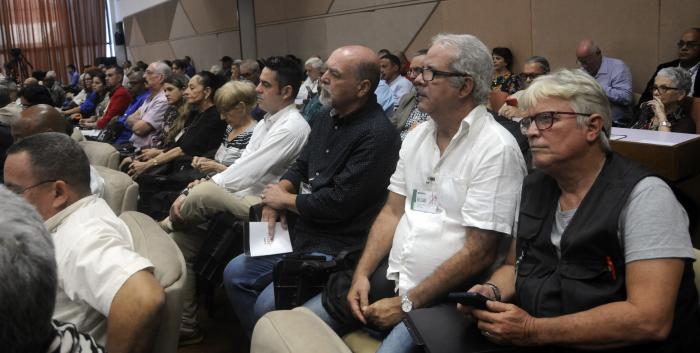
I insist on what I said at the previous Congress and have repeated on several occasions: it is not a problem of artistic genre, the problem will always be what they promote in terms of values. But by being absent from the phenomenon, by staying on the sidelines, we will never succeed in influencing their creations or in adding them to the cultural policy of the Cuban Revolution.
The fact that subversive laboratories based in the United States have recently turned to exponents of this genre to reach out to popular sectors is a not insignificant sign of the impact they have on increasingly broad segments of the country, which we also have to know how to reach. This has to do with culture and Revolution.
In these five years the Revolution has been severely threatened by repeated attempts at destabilisation, manipulation of false news and constant attempts to dismantle history. In each of these circumstances we have witnessed, with no little pain, expressions and attitudes of artists and creators accepting as valid some enemy matrices and even joining in their dissemination in an unthinking manner.
In the face of attempts to dismantle and distort history, especially that of the Revolution, how are we supposed to react? Are the cultural industries designed to lie, manipulate, denigrate the heroes and martyrs of the homeland? Do our media have to legitimise works that promote anti-values? Does our criticism have to be absent and not insist on these problems? It is not only a question of creative freedom, it is a question of ethics and principles. It is once again a question of saving the homeland, which is also a question of saving culture.
Graziella Pogolotti insisted that to the extent that the man of today recognises himself in his historical moment in today’s Cuba, and achieves this through his daily action and the reaffirmation of his daily values, he will then be a fuller, more convinced, more integral combatant in all aspects of life.
Let us recall the message of Army General Raúl Castro Ruz, on the occasion of Uneac’s 55th anniversary: «Today we are doubly threatened in the field of culture: by subversive projects that seek to divide us and by the wave of global colonisation. The Uneac of today will continue to face these complex challenges with courage, revolutionary commitment and intelligence.
Let us then develop the cultural and spiritual forces of the Cuban nation, those that generate emotions, generate passion and commitment, ground us in our historical and cultural roots, increase patriotic, revolutionary and humanist values and strengthen our revolutionary convictions and, above all, our pride in being Cuban men and women.
There is much to be done to support what we say; there is much to be done to improve, to strengthen; there is much to be done in community cultural work, in the teaching of history, in improving education, in creating economic wealth to distribute with social justice and to be able to sustain the immense social work of the Revolution, and to create more spiritual wealth.
In an interview with Teresa Melo, several years after the Special Period, someone asked her how we had survived when everything collapsed. She, as always, brilliantly replied: everything collapsed, except dreams.
Working together, with participation, with the soul rooted in the earth, with creative resistance, which implies robust cultural resistance with ethics and beauty; with science and conscience, with intelligence, implementing and following up on what was addressed in this historic Congress, only in this way will we find solutions.
I am one of those who believe that yes we can!
Thank you very much (prolonged applause).

